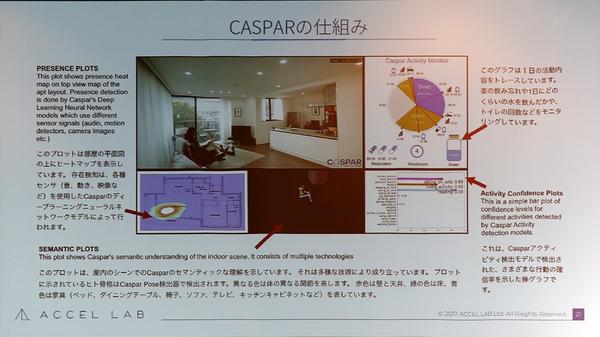On October 4, 2018, Asahi Interactive held a real estate business utilizing the latest technology in Tokyo and the "CNET JAPAN CONFERENCE Real Estate Tech Conference 2018 -Accelerator Transformation" to make the transformation of urban development business.The event is the third time in 2018.In this paper, we will introduce the lecture by Axel Labo, Gaku Oguri, "Future of Real Estate and Technology IoT / AI".
Looking back around me, technology has expanded in every space.Axel lab, which handles AI (artificial intelligence) platforms and IoT devices, etc., raising the "Space x Technology Creation with Technology."I guess "Ta" (Mr. Kogure).Beginning with a 20,000 -year -old wall -hole -type dwellings, the Edo Nagaya in the 1860s, the wooden apartments expanded in the 1940s, and the high -rise building became a standard building in the 2000s.The company questions the architectural factor that focuses on earthquake resistance, disaster prevention, design, and luxury, saying, "We think we should have added value to housing."
アクセルラボ 代表取締役 小暮学氏The residents do not say that hardware is unnecessary.Hardware is a premise factor, for example, a demand for a residential space where you can get UX (user experience), such as being healthy, easy to learn, and living healthy with peace of mind, and shifts to a residential space, and "UI/UX is" UI/UX.High real estate development is required. "(Mr. Kogure) emphasized.
According to one theory, people spend 60%of their lives, and their comfort and convenience are counted as important factors.However, the company's opinion is that it is not enough for air conditioners and baths to become smart.For example, when you go to the bathroom in the middle of the night, you have to turn on a dark room, and you have the risk of falling before pressing the switch.The company said that it needed technologies and software for "the house to be a person" and introduced the overseas situation.

Alarm is currently leading the IoT market for housing in the United States..Com, ComCast, Vivint.SMARTHOME and Honeywell.It is said that it is growing greatly due to the increase in demand for security and convenience.It starts with high -end housing and is now spreading to general houses.According to data presented by Axel Lab, about 7.9 million households have introduced IoT security as of 2016, but in 2017 it has expanded to about 10 million households.While the existing home security business is slow, plus 15.It shows the annual growth rate of 7%.In China, the same movement was shown, and Europe was late for the start, but began to show signs of growth in 2017.According to the company, "Japan is difficult to see in Japan, but the market has finally warmed here, but the market has finally warmed up."
Apparently in the background, in the accelerator lab, various things in the house are controlled with a smartphone..(Alysa) was released in February 2017.The locking of the entrance is also started by launching the application, checking the situation, and locking it when unlocking.Before returning home, you can add hot water to the bathtub from the app, cool the room with an air conditioner, or heat up the floor.
alyssa.The registered user rate for the number of downloads is 46%, of which the MAU (monthly active user) rate is 92%.As you know, the company analyzes the reasons why the frequency of use has been improved, as you know, "As you know, there are few dozens of apps that you use every day.He said he was convinced that development was important.
According to the next development, "I succeeded by connecting the switch to the cloud, but the switch on the wall has just turned into a touch. I'm thinking about automation next."Specifically, in order to realize "a world where the house itself changes temperature and brightness according to the situation", it is necessary to have AI to learn human behavior and hobbies and taste autonomously.Therefore, the company is working on a strategic partnership with Brain of Things, which is developing AI for housing in the United States, and is working on the practical use of Caspar.
CASPAR is made up of a three -layer structure of connect, AI, and UX.A connect layer that grasps the condition of a person using a motion sensor, visual sensor, microphone, etc.For example, it is the AI layer to learn and analyze residents' behavior, such as vacuuming.It is the UX layer to execute the results obtained from these two layers as triggers.According to Axel Lab's explanation, when machine learning progresses, it is possible to automatically open and close curtains by detecting wake up and bedtime.The company said, "It is an intelligent home that can be used not only to make life convenient but also to support the elderly and watch children and pets while detecting people's situation."
CASPARの概要In the context of real estate tech, existing Alyssa.Is "Alyssa" according to the demand of real estate officials."Cloud" has been developed since June 2018.alyssa.Is "Alyssa.Renamed to "TOUCH"."Alyssa" that reports various simulations, such as checking the rent deposit and withdrawal statement, owning multiple units, and property assessments.In addition to "DESK", "Alyssa" to achieve smooth communication with residents.Chat "," Alyssa "to learn financial information and investment.This is a solution that covers "COLLEGE".
Especially Alyssa.Chat has a great deal of "push from the app" (Mr. Kogure) because it can properly communicate information to residents who do not see guidance or announcements on the bulletin board of the apartment.It can be used for the guidance and attendance of the general meeting in condominiums, so it will be possible to operate more smoothly.The company will promote the development of each solution while raising "Japanese real estate development and communication of communication".
